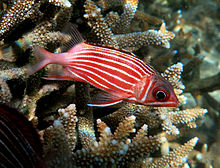| Sargocentron diadema | |
|---|---|

| |
| Scientific classification | |
| Domain: | Eukaryota |
| Kingdom: | Animalia |
| Phylum: | Chordata |
| Class: | Actinopterygii |
| Order: | Beryciformes |
| Family: | Holocentridae |
| Genus: | Sargocentron |
| Species: | S. diadema |
| Binomial name | |
| Sargocentron diadema (Lacépède, 1802) | |
Sargocentron diadema, known commonly as the crowned squirrelfish, is a species of marine ray-finned fish belonging to the family Holocentridae, which is the only family in the order Holocentriformes. Squirrelfish in general are large, active, nocturnal fish which are usually red in color.
Distribution
The crowned squirrelfish is commonly found on the reefs of the Indo-Pacific, from East Africa to Tahiti.
Description
The fish is bright red with thin white lines crossing from the gill cover to the caudal peduncle. The gill cover has two vertical white lines. A third line runs along the upper lip and below the large eye.
In captivity
This species is sometimes kept in aquaria. It is an active, shoaling fish which is kept in large tanks with other individuals of the species. Other species of a similar size can be kept with it, but it may eat smaller fish. It can be sustained on meat-based fish food.
The aquarium is kept between 72 and 78 °F (22–26 °C) the pH is about 8.1 to 8.4, and the salinity is 1.020 to 1.025.
References
- The Taxonomicon
- ^ Bailey, M. and G. Sandford. The Ultimate Encyclopedia of Aquarium Fish & Fish Care. p. 246.
- ^ Mills, D. Eyewitness Handbooks Aquarium Fish: The Visual Guide to More Than 500 Marine and Freshwater Fish Varieties. pg. 284.
- Aquatic Community
External links
- Photos of Sargocentron diadema on Sealife Collection
| Taxon identifiers | |
|---|---|
| Sargocentron diadema | |
This Beryciformes-related article is a stub. You can help Misplaced Pages by expanding it. |